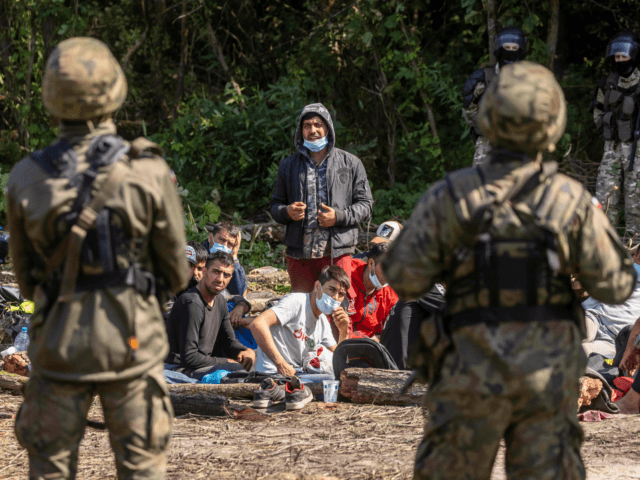The European Union will grant detention and deportation powers to Poland, Lithuania, and Latvia to fend off the migrant crisis on their borders that is largely believed to be orchestrated by Belarussian dictator Alexander Lukashenko.
In a significant concession to Warsaw and Vilnius, Brussels has agreed to loosen restrictions on illegal migrants and asylum seekers for at least the next six months in order to grant more “flexibility” to states bordering Belarus.
The main rule change will allow Poland, Lithuania, and Latvia to extend the time in which migrants can be detained in migrant centres for four weeks as opposed to the standard three to ten-day period. Including any asylum appeals, migrants can be held in detention for up to sixteen weeks.
The move will allow the countries extra time to deport the migrants, rather than them being allowed into their country while their asylum claim is processed. The regulations on deporting migrants will also be loosened up, allowing for “simplified and quicker national procedures for the return of people.”
Announcing the agreement, the EU’s Commissioner for Home Affairs, Ylva Johansson, said: “Although the EU’s intense efforts have brought rapid results, the situation remains delicate. Today, to protect our borders, and to protect people, we are giving flexibility and support to Member States to manage this emergency situation, without compromising on human rights.
“This should allow the Member States in question to fully uphold the right to asylum and align legislation with EU acquis. It’s also time-limited and targeted. To make our response to hybrid threats future-proof, we activate the EU’s formidable diplomatic and legal capacity, to apply sanctions and persuade third countries to stop flights.”
The move from the bloc has been criticised by human rights organisations, including Amnesty International, which accused the EU of dehumanising migrants, claiming that under the rule suspension, they can be detained “without the protection standards required by international law”.
The EU, for its part, has said that guarantees over the welfare and treatment of migrants must be upheld in the detention centres.
Europe Under Attack: Polish Border Guards Again Defend Border From Belarus-Backed Migrants https://t.co/sEaPzAUv5Z
— Breitbart London (@BreitbartLondon) November 26, 2021
The European Union has accused Belarus of enacting “hybrid warfare” against Poland, Lithuania, and Latvia by transporting migrants to the bloc’s Eastern frontier, with the migrants reportedly being given false promises of free passage to Germany or Poland should they reach EU soil, a claim both countries have denied.
Polish Prime Minister Mateusz Morawiecki has accused Belarussian dictator Alexander Lukashenko of attempting to “blackmail” Europe in response to sanctions imposed on his regime earlier this year.
Lukashenko has not denied that his forces may be orchestrating the attempts by migrants to breach the borders of Europe, excusing the actions by saying that Slavs have “big hearts”. He has gone on to pronounce that migrants have a “right” to enter into the EU and vowed to provide aid to the migrants so they can achieve their “dream”.
On top of increasing border protections, the three nations, alongside the other Baltic states are currently in talks over a possible triggering of Article 4 of the NATO convention, which states that “Parties will consult together whenever, in the opinion of any of them, the territorial integrity, political independence or security of any of the Parties is threatened.”
In an interview with Breitbart London last week, Lithuanian MP Dovilė Šakalienė accused the Belarussian dictator of using migrants as “siege” weapons against Lithuania, Poland, and Latvia, the three European countries that share a land border with the former Soviet state.
“So we are protecting the borders of NATO and the EU from the unpredictable, very hostile dictator, who has instrumentalized migration as a means of political war,” she said.
Exclusive: Lukashenko Using Migrants as ‘Siege’ Weapons to ‘Save His Skin’, Says Lithuanian MPhttps://t.co/X1p2nhOf0f
— Breitbart London (@BreitbartLondon) November 28, 2021
Follow Kurt Zindulka on Twitter here @KurtZindulka

COMMENTS
Please let us know if you're having issues with commenting.